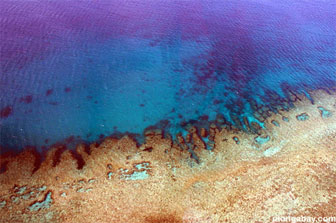Global warming may cause permanent damage to coral reefs
Global warming may cause permanent damage to coral reefs
mongabay.com
May 15, 2006
Global warming has had a more devastating impact on coral reefs than previously believed says a new study published in the Proceedings of the National Academy of Sciences.
The research, the first to show the long-term impact of rising sea temperatures on coral and fish communities, suggests that “large sections of coral reefs and much of the marine life they support may be wiped out for good,” according to a news release from the University of Newcastle upon Tyne, an institution involved in the project.
The report shows the long-term impact of 1998’s record high sea temperatures which caused a worldwide coral bleaching event. Bleaching causes coral to expel symbiotic zooxanthellae algae living in their tissues — algae that provide corals with nourishment. Losing their algae leaves coral tissues devoid of color, and thus appearing to be bleached. Corals can recover from short-term bleaching, but prolonged bleaching (over a week) can cause irreversible damage and subsequent death. Coral bleaching is associated with a variety of physiological stresses, the most important of which is elevated sea surface temperatures.
Based on surveys of 21 sites covering over 50,000 square meters of coral reefs in the inner islands of the Seychelles in 1994 and 2005, the international research team found that coral cover declined significantly following the 1998 event which bleached 90% of the region’s coral. In 2005 average coral cover in the area surveyed was just 7.5 percent and fish diversity had decreased by 50 percent in the most effected areas. The researchers say that collapse of reefs ruined habitats for resident fish species and eliminated important food sources.
The survey found that four fish species may be locally extinct and another six species are at critically low levels. The scientists say that the disappearance of smaller fish species may have a more lasting effect on the food chain, especially given the reefs’ relative isolation which makes recovery more difficult since larvae cannot recolonize from outlying reefs.
 Photo by Rhett Butler |
“We have shown there has been very little recovery in the reef system of the inner Seychelles islands for seven years after the 1998 coral bleaching event.” Lead researcher Nick Graham, of Newcastle University’s School of Marine Science and Technology, said. “Reefs can sometimes recover after disturbances, but we have shown that after severe bleaching events, collapse in the physical structure of the reef results in profound impacts on other organisms in the ecosystem and greatly impedes the likelihood of recovery.”
The study comes as scientists are increasingly concerned for the long-term propects of coral reef ecosystems. Several studies have recently warned that the world’s coral reefs face a grim future should global temperatures and atmospheric concentrations of carbon dioxide continue to rise. Higher ocean temperatures will produce increasingly severe bleaching events, while elevated levels of carbon dioxide could further acidify the world’s seas. Ove Hoegh-Guldberg, head of the University of Queensland’s Centre for Marine Studies, believes that Australia’s Great Barrier Reef — the world’s largest reef — could lose 95 percent of its living coral by 2050 should ocean temperatures increase by the 1.5 degrees Celsius projected by climate scientists.
RELATED ARTICLES
Damaged Caribbean reefs under attack After experiencing one of the most devastating coral bleaching events on record during September and October of 2005, reefs in the Caribbean are under attack from deadly diseases according to Reuters. Warnings of the onset of the bleaching event were first reported by the National Oceanic and Atmospheric Administration (NOAA) Coral Reef Watch Satellite Bleaching Alert monitoring system in late August in the Florida Keys. The bleaching spread through much of the eastern Caribbean in September and October.
Coral reefs decimated by 2050, Great Barrier Reef’s coral 95% dead Australia’s Great Barrier Reef could lose 95 percent of its living coral by 2050 should ocean temperatures increase by the 1.5 degrees Celsius projected by climate scientists. The startling and controversial prediction, made last year in a report commissioned by the World Worldwide Fund for Nature and the Queensland government, is just one of the dire scenarios forecast for reefs in the near future. The degradation and possible disappearance of these ecosystems would have profound socioeconomic ramifications as well as ecological impacts
Pacific Ocean getting warmer and more acidic The Pacific Ocean is getting warmer and more acidic, while the amount of oxygen is decreasing, due to increased absorption of atmospheric carbon dioxide say scientists from the National Oceanic and Atmospheric Administration’s Pacific Marine Environmental Laboratory and the University of Washington.
Dubai’s artificial islands have high environmental cost While there have been numerous articles written recently about the proliferation of artificial island projects, the astounding “The World” venture among them, few have addressed or assessed the environmental impact of such massive undertakings and the transformation of both the sea and landscape. Until recently, Nakheel, the government-controlled corporation developing these ambitious projects, has been able to focus predominantly on promoting rather than defending the islands, but new evidence of environmental detriment is bringing the company and its projects under fire from certain groups.
This article uses information and quotes from earlier mongabay.com articles and a press release from the University of Newcastle upon Tyne.